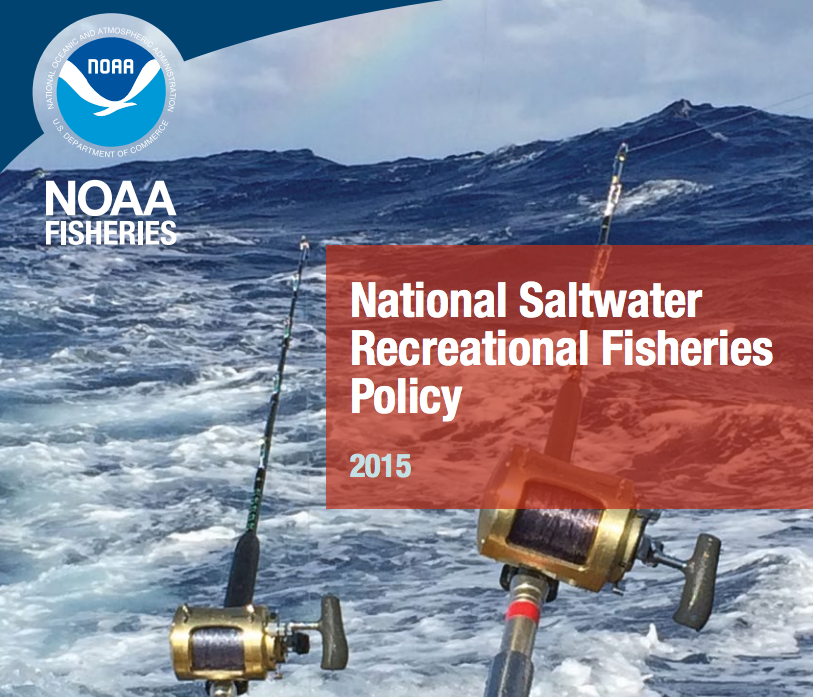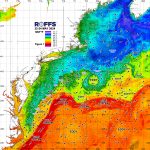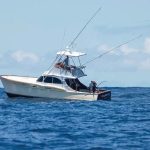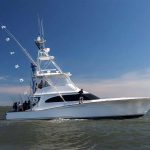Courtesy: www.asafishing.org | Please click here for original posting.
Saltwater recreational fishing is a traditional American pastime integral to social, cultural, and economic life in coastal communities across the nation. This time-honored activity allows millions access to America’s great outdoors each year, while generating billions of dollars in economic activity.
Traditionally shaped by commercial forces, demographic, market, and ecological shifts are changing the nature of U.S. fisheries. Our nation’s expansive coastal and ocean resources face increasing pressure as coastal populations grow, and more people pursue recreational opportunities in ecologically important marine and estuarine areas.
Beginning with its roots as the Commission of Fish and Fisheries in 1871, NOAA’s National Marine Fisheries Service (NMFS) has played a continuous leadership role in science-based stewardship of our nation’s living marine resources. NMFS is responsible for maintaining healthy marine and coastal ecosystems capable of supporting sustainable and productive fishery resources for the longterm use and benefit of the nation.
In so doing, NMFS recognizes the substantial benefits to the nation associated with saltwater recreational fishing and is committed to pursuing a collaborative stewardship approach promoting safe public access to fishery resources, fishery sustainability, and regulatory accountability suited to the unique nature of recreational fisheries. To this point, NMFS recognizes the inherent differences between recreational and commercial fisheries and the need for stewardship approaches able to best accommodate each while achieving fishery conservation and management goals.
In February 2014, the non-governmental Morris-Deal Commission published a report highlighting a series of concepts to improve stewardship of saltwater recreational fisheries, including formulation of a national policy. In April 2014, NMFS and the Atlantic States Marine Fisheries Commission conducted the second National Saltwater Recreational Fisheries Summit with constituents from across the nation. NMFS announced its intent to transparently develop a recreational fisheries policy statement for release early in 2015 at the conclusion of the summit.
Policy Purpose, Goals, and Scope
The purpose of this policy is to provide guidance for Agency consideration in its deliberations pertaining to development and maintenance of enduring and sustainable high quality saltwater recreational fisheries. This policy identifies goals and guiding principles to be integrated into NMFS’ planning, budgeting, decision-making, and activities, and includes examples of implementation concepts and strategies supported by NMFS.
Consistent with, and in furtherance of, the purposes of the Magnuson-Stevens Fishery Conservation and Management Act (MSA) and other applicable federal statutes, the goals of this policy are to: 1) support and maintain sustainable saltwater recreational fisheries resources, including healthy marine and estuarine habitats; 2) promote saltwater recreational fishing for the social, cultural, and economic benefit of the nation; and, 3) enable enduring participation in, and enjoyment of, saltwater recreational fisheries through science-based conservation and management.
This policy pertains to non-commercial activities of fishermen who fish for sport or pleasure, as set out in the MSA definition of recreational fishing, whether retaining (e.g., consuming, sharing) or releasing their catches, as well as the businesses and industries (e.g., the for-hire fleets, bait and tackle businesses, tournaments) which support them.
This policy recognizes the authorities and responsibilities of other federal natural resource management agencies, regional fishery management councils, interstate marine fisheries commissions, states, tribes, and advisory bodies.
Policy Statement and Guiding Principles
It is the policy of NMFS to foster, support, and enhance a broadly accessible and diverse array of sustainable saltwater recreational fisheries for the benefit and enjoyment of the nation. The following six principles will guide NMFS decision-making and activities in the execution of its stewardship responsibilities.
1. Support ecosystem conservation and enhancement. NMFS recognizes a wide range of approaches to restore, maintain, and build diverse healthy marine ecosystems that are foundational to high quality recreational fisheries. Examples of strategies that NMFS supports include:
• Restoration and conservation of habitats that benefit recreational and other fish stocks
• Development and application of best practices to support anglers as stewards of a sustainable environment
• Science-based habitat enhancement activities, including artificial reefs and natural habitats in accordance with Agency policy, which contribute to the conservation and management of recreational fisheries
• Conservation of abundant and resilient forage fish stocks integral to healthy ecosystems and recreational fisheries
• Development and application of aquaculture tools and technologies that support recreational fisheries consistent with existing agency policy (e.g., stock restoration, production of baitfish, shellfish seed for habitat restoration)
2. Promote public access to quality recreational fishing opportunities. NMFS recognizes the fundamental importance of broad public access to healthy and sustainable fisheries resources to recreational fishing. Examples of strategies that NMFS supports include:
• Decision-making that fully considers social, cultural, economic, and ecological factors
• Recurring evaluation of fishery allocations to facilitate equitable distribution of fishing opportunities as fisheries develop and evolve
• Expanding fishing opportunities (e.g., longer-fishing seasons, increased allowable catch levels), when appropriate, based on demonstrated conservation gains
• Understanding and addressing factors affecting angler participation and satisfaction
3. Coordinate with state and federal management entities. NMFS recognizes that improving fisheries science and management is best achieved through collaboration and partnership with state and federal management entities. Examples of strategies that NMFS supports include:
• Aligning program goals and implementation strategies in support of sustainable recreational fisheries
• Enhancing regulatory compliance by improving public awareness and understanding of recreational regulations and through effective enforcement
• Reducing redundancy, leveraging resources, and exploring opportunities for co-management of recreational stocks
• Supporting equitable representation of recreational fisheries interests in decision-making forums
4.Advance innovative solutions to evolving science, management, and environmental challenges. NMFS recognizes its responsibility to lead and facilitate development of innovative approaches and solutions to evolving stewardship challenges in rapidly changing fisheries environments. Examples of strategies that NMFS supports include:
• Developing and supporting cutting-edge scientific tools and approaches to increase knowledge of recreational fisheries and the marine ecosystems (e.g., acoustic and hi-resolution video surveys, next generation stock assessments)
• Exploring management approaches that have the potential to better accommodate the unique nature of recreational fisheries while achieving conservation mandates
• Encouraging and incentivizing development and use of new gear technology that provides conservation gains (e.g., improves release survival)
• Applying creative approaches to problem solving and embracing expertise outside of the Agency (e.g., crowdsourcing, on-the-water experience, external partnerships)
5. Provide scientifically sound and trusted social, cultural, economic, and ecological information. NMFS recognizes its pivotal role in providing world class science to facilitate informed decisionmaking and effective stewardship. Examples of strategies that NMFS supports include:
• Partnering with the fishing, academic, non-governmental, and management communities to develop and implement cooperative research activities on recreational fisheries and integrating defensible results into management
• Collecting recreational catch and effort, social, and economic data that support transparent and participatory management and conservation of saltwater recreational fisheries
• Considering recreational fisheries needs in the prioritization of Agency science activities
6. Communicate and engage with the recreational fishing public. NMFS recognizes the need to build public confidence and expand understanding of science and management processes. Examples of strategies that NMFS supports include:
• Communicating, in plain language, the basis for and implications of regulatory actions, and the details and results of relevant scientific programs and research
• Listening, understanding, and responding to recreational angler issues and perspectives
• Empowering recreational anglers with information to become resource stewards and effectively engage in the fishery management process
Implementation
The NMFS National Policy for Saltwater Recreational Fisheries is effective upon release and supersedes previous agency policy guidance for saltwater recreational fisheries. This policy will, henceforth, guide NMFS’ approach to saltwater recreational fisheries until such time as it is amended or rescinded by the NOAA Assistant Administrator for Fisheries.
The policy will be implemented through consideration and integration of policy goals and supporting principles at all levels within the Agency including office and program level planning, budgeting, and decision-making. NMFS Regional Administrators, Center Directors, and headquarters Office Directors will play a critical role in successful policy implementation, as Agency representatives to the regional fishery management councils and interstate marine fisheries commissions, principal liaisons to state and other federal agencies, and managers of personnel who interact with the public on a daily basis. In addition, the Agency will develop and update national and regional saltwater recreational fisheries implementation plans.
In implementing this policy, it is incumbent upon NMFS to execute its stewardship responsibilities in a manner that minimizes disruptions to, and burdens on, the regulated community while improving public understanding of, and participation in, the regulatory process.
Authorities and Responsiblities
NMFS’ headquarters directorate and office directors, regional leadership (Regional Administrators and Science Directors), and the National Policy Advisor for Recreational Fisheries are responsible for Agency-wide implementation of this policy.
This policy is not intended to, and does not, create any right or benefit, substantive or procedural, enforceable at law or in equity by any party against the United States, its departments, agencies, or entities, its officers, employees or agents or any other person.






